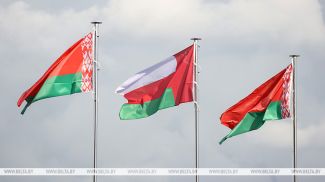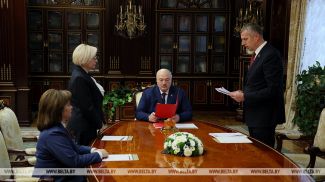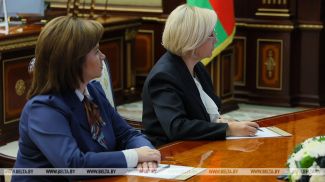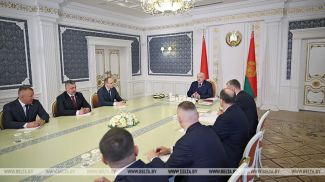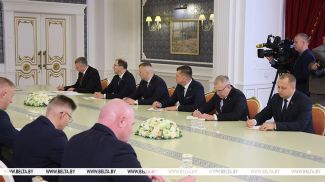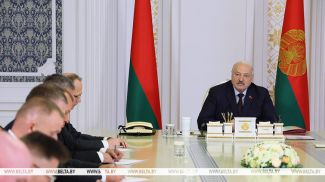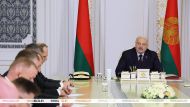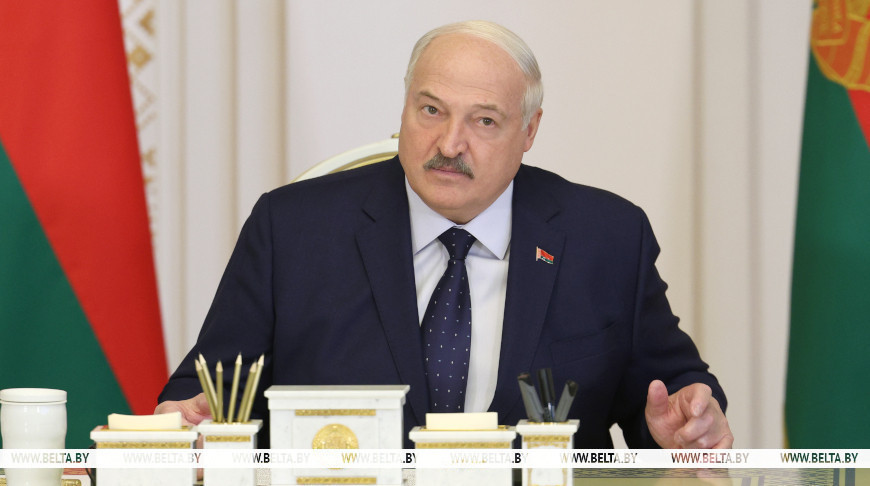
MINSK, 25 April (BelTA) – Belarusian President Aleksandr Lukashenko spoke about plans to bring in migrant workers to Belarus, including from Pakistan, BelTA has learned.
The head of state commented on one of the topics that is being discussed on the Internet after his talks with the leaders of Pakistan: “We did have such a conversation, they raised the topic of labor resources, as they have them in excess, and we do not have enough.”

Aleksandr Lukashenko noted that many countries and regions, including the European Union and Russia, are struggling with the shortage of labor resources. “Naturally, the European Union, Russia, and, probably, Belarus will have to accept the fact that people from other countries, mostly Asian nations, will work here. During the negotiations with the Pakistanis, we agreed that we will draft a program that will be approved by an intergovernmental agreement. In other words, we need to develop a mechanism to prevent the things that some are trying to scare us with,” the president said.
He remarked that some are exploiting this topic in order to rile up the Belarusian society. “I have instructed the KGB to find out where it's coming from. It has come from the self-exiled opposition. They carefully watch what we do and put their own spin on what we say in order to try to make it part of public discourse. They [the KGB] found one such source in Belarus. It turned out, it was a 16-year-old brat. Well, it is highly unlikely that he studied all the materials and came up with this idea himself. They sent him the information from there [abroad] and told him to twist it. If my memory serves me right, such a group was detected in Brest Oblast,” noted Aleksandr Lukashenko.
Speaking about migrant workers, Aleksandr Lukashenko recalled that labor productivity in Belarus is still two to three times lower than that in the European Union. “This is an unpopular thing to say, but let's face it: if some people here are afraid of foreigners, let these people do the work of two or even three workers. And in the next 10-15 years workforce will not be an issue. Do we want this? Not really. This is not a popular thing to say, but at least it's honest,” the Belarusian president said.
The head of state also mentioned another factor that has an impact on the workforce availability in the country: “There is a way out of this situation. We need to have more kids. Three, four, or better yet, five. “Doesn't the government help big families? It does.”
“We don't want to have more children and we don't want to work hard. But we want to grow, we want salaries, we want the country to prosper and be independent. Everything is about the economy. And the economy depends on labor resources,” Aleksandr Lukashenko said outlining the problem.
“If we want our country, our people to survive, be sovereign and independent, build a museum celebrating the history of Belarusian statehood and our nation, we should focus on economy. Economy is about people. If we want to work, manage processes, we should not be afraid [of migrants from other countries]. We will have, say, 60 or 100 foreigners per a thousand people. This is a normal thing. In general, we have enough workforce. And if we need to address labor shortage in some industries, we will thoroughly check each migrant worker before inviting them to live on this most beautiful land - Belarusian land. Those who want to work are welcome here, no matter what country they come from,” the Belarusian leader said.
The head of state noted that migrants from various countries should be dispersed throughout Belarus. While inviting migrant workers, the priority will be given to families.
As for Pakistanis, only two dozen Pakistanis have come to work in Belarus so far. “Have they destabilized the situation? No. I have inquired about how they work. There are no problems with them,” the president remarked.
He said that the topic of labor migration was discussed during the negotiations with the Pakistani leadership: “He [Pakistan Prime Minister Shehbaz Sharif] said: I don't want any troublemakers to come to your country; only those who want to work should come, if you are interested in them. I responded: I like this approach.”
Aleksandr Lukashenko said that at the talks in Minsk Pakistani Prime Minister Shehbaz Sharif proposed signing an intergovernmental agreement that would spell out all the aspects of labor migration from Pakistan to Belarus. This includes sending skilled specialists to Belarus. Such workers are much needed at the cotton mill in Baranovichi. The Pakistani side suggested providing Belarus with the necessary raw materials and specialists. “Pakistan's textile industry is one of the best in the world. They sell textile products all over the world. If they help us in Baranovichi, send specialists... I said: it is a great idea, we will create all the conditions, even build housing, if you provide us with raw materials and the specialists that we need. And we will work together,” the Belarusian head of state emphasized.
“It is a win-win: we provide you with this, you buy it, we help you with this and that. And many other things. It was the purpose of these negotiations. This is in the interests of our state,” the Belarusian leader emphasized.
In total, 85,000 specialists from various countries are currently employed in Belarus. Responding to insinuations that migrants from Pakistan or other countries would wreak havoc in Belarus, Aleksandr Lukashenko said: “We have not allowed anyone to turn the country upside down and we never will. In 2020, it was not Pakistanis who were running around the Palace of Independence here.”
The president also remarked that many migrants from Ukraine have come to Belarus in recent years, and they also do not cause any problems. “No one will move to another country on a whim. People leave their homes because they have to run for their lives. People who know what misery is will appreciate the things a host country offers them, like accommodation, access to free education and healthcare. And they work hard and have a strong work ethic. And their children will be like that. So what are we afraid of?” the head of state asked rhetorically.
“This is my problem. I will address it in a way that will benefit our people, the best people of our Belarus. I have always taken this into account and will continue to do so,” Aleksandr Lukashenko assured.
According to him, Belarus needs workforce, primarily Vitebsk Oblast, Mogilev Oblast and Gomel Oblast. “We have vacant houses, and we need people in agriculture,” he said.
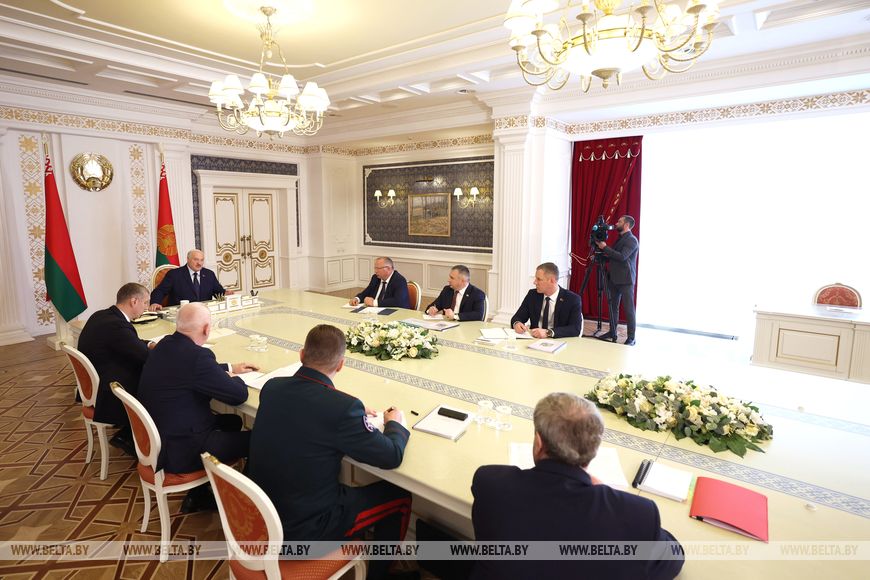
In this regard, the president addressed Gomel Oblast Governor Ivan Krupko who attended the meeting on the development of areas affected by the Chernobyl disaster. “Ivan Ivanovich, here is a task for you. Find people, families in any part of the world, even in Africa. One or two - this is up to you. Check them, register them, give them a job. Find the work they can do the best, pay them a salary, give them a land plot. They often ask for a piece of land. We have enough of it. Let them work as farmers, if they want, on our terms and in line with our law. If they fail to strictly abide by the law, they will be sent back to their homeland,” Aleksandr Lukashenko said describing the approach to migrant workers.
“I emphasize once again, no matter how the situation develops, there must be order in our country. We should develop a mechanism, and it should be approved by our government and their government [reference to Pakistan], exercise tough control over migration and invite and employ those who want to work here,” the Belarusian leader said.
Speaking about Belarusian self-exiled opposition who whip up hysteria over migration, Aleksandr Lukashenko said: “They will not help us anymore. Are they going to approach Krupko for jobs in agriculture? No, they are there [abroad], nagging. They were offered jobs as dishwashers. They say they can't wash dishes... They don't want to do that, they don't want to sweep the streets. So what kind of jobs are they looking at? Do they expect to get the right to run Poland? No, they have Poles to govern Poland. They can do this well. So why did they go there? They need to be smarter - live and work on their own land,” Aleksandr Lukashenko added.




